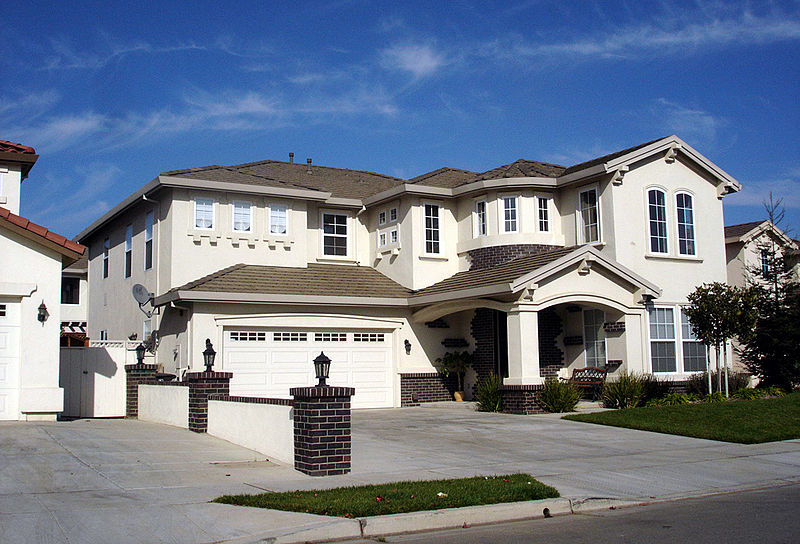I have become solidly middle class. My husband and I have so long been accustomed to thinking of ourselves as a sort of “X-class” as starving graduate students and then starving academics. When I quit my job and he changed careers, we spent a glorious year in deep poverty living in Texas among a community entirely composed of undocumented Spanish-speaking folks. It is easy to feel good about spirituality and discipleship when you by necessity live a simple life, and especially when you live among the poor.
We don’t live that life anymore. Last summer we bought a house on the most middle class street you ever saw, smack in the middle of America. It’s an old (though charming) house and it needs work, so we spend many of our weekends with the rest of middle America at hardware stores and Target. With another baby on the way, we have finally outgrown our hand-me-down beater and are buying a minivan. Nothing says middle class like a minivan.
Becoming middle class has been hard for me, especially as a stay-at-home mom. It is especially hard to figure out what discipleship looks like in such a normal, middling life. I don’t spend most of my days (or really any) directly among the poor. My neighborhood and parish are overwhelmingly white. When Jesus said, “Take up your cross and follow me,” it is hard to see how he had my life in mind.
And yet, for the time being, this is my life and it isn’t changing. So I have had to re-conceptualize what discipleship looks like in the here and the now, even if it isn’t what I imagined. And I have some thoughts:
1. Where are my saints?
My spirituality is very centered on the veneration of the saints. But the transition to middle-class mom has been a lonely one as very few spiritual companions have been there to accompany me. It is hard to find models of holy women doing what I am doing—raising kids, taking care of a home. There is Gianna Mola, but really what she is known for is sacrificing her life for her unknown baby, which I am thankfully not being asked to do right now. Elizabeth Ann Seton was a mom, though not exactly middle class, and really, I don’t think I am going to found a Catholic school or hospital system anytime soon. There are the parents of St. Therese, who are called saints in part to meet this need for models of people living my life. But the canon of saints has a privation and I feel it.
2. Just because I am middle class doesn’t mean I need to be materialistic
Materialism and consumption, in a large part, characterizes the middle class. I have noticed this especially in my neighborhood small talk:
“Where did you get those leggings?” “Oh, they are Lula Roe. My friend is having a house party. I can send you a facebook invite so you can get some.”
“I love your new patio furniture.” “It’s on sale at Home Depot. You should check it out.”
“Want to go to yard sales with me this Saturday?”
Consumption is the norm, but it doesn’t have to be. Simplicity is, if you will, a virtue for the middle-class especially that is constitutive of a good life. I would characterize simplicity as a habit of doing without. Like any virtue, this looks different depending on one’s circumstances, but simplicity might be manifest in a decision to not buy a new bathing suit (or any other new wardrobe item) for the season. It might be manifest in a decision to not upgrade to a bigger house as the kids get bigger. It might be manifest in developing alternate practices for the weekends than shopping—nature walks or family game night or bike rides. What is important is that simplicity as a virtue minimizes consumption prudentially.
3. Leisure is still the basis of culture
Josef Pieper wasn’t the first, though he has been a popular contemporary advocate of the importance of leisure, which is not idleness or laziness but rather a conscious orientation of one’s life towards truth, beauty, and goodness. As an academic, my whole life was leisure. I got paid to read books, to discuss ideas, and advance new ones. As a middle class mom, leisure is much more elusive. And yet, leisure is no less important in this stage of life. For one, leisure is an antidote to the slavish habits of consumerism. Second, leisure helps to transcend my middling life beyond the mundane in opportunities to encounter the divine. What does leisure look like? For me, it has always involved books. Lots and lots of books. With kids, I have tried to share that and books are my children’s main source of entertainment. I work hard to find beautiful picture books and chapter books at the library to share with my children and our family culture revolves in a large way around reading aloud. Time in nature, especially away from manicured lawns and ornamental trees is another important leisure pursuit in our family. But leisure is found in many places: excellent music (listening to and playing), the arts (both in their creation and appreciation), theater. Anything that involves the conscious pursuit of truth, beauty and goodness as opposed to servile labor or mindless entertainment can be an important source of leisure.
4. Don’t forget the poor
This has been the hardest part of my transition to the middle class. It is really, really hard to feel like I am fulfilling my Christian duty to care for the poor, both in a private charity and in a larger social justice sense. Of course, the parish has opportunities to buy toilet paper for the women’s shelter or presents for local impoverished children or canned food for the Catholic Worker House, but these often fell like paltry efforts. Necessary, but paltry. As a person who believes very much in the importance of connatural knowledge that comes from personal experience, I worry about loving the poor who I so very rarely, in my everyday life, get a chance to actually see. What seems to be missing are practices of encounter for the middle class to intersect their lives on a regular basis with the poor we are called to love.
5. We need to be serious about the moral pitfalls of the middle class
Inevitably, when I talk about class, people get a little squeamish. “It’s not a sin to be middle class,” I’ve been told more than once. And, of course, it isn’t. But the middle class certainly is prone to a number of sins that we need to be realistic about. Many of these are “social” sins—consumerism and habitual misuse of our environment, for example. But inherent in the middle class also is a real discontent—the need for more, for better, for bigger. It is common practice in the middle class to upgrade houses and cars, switch to better schools, buy better (and more expensive food), try new online (and delivery!) services. Again, none of these are necessarily bad in themselves but the habitual need for MORE is the basis for a lot of sin, and the middle class is particularly prone to this. To look critically at the middle class lifestyle does not mean that we are criticizing or judging any particular person or way of life, but rather looking at practices and habits that lead us astray from our call to discipleship and from an abundant life. Honesty and humiliation in our self-reflection is essential if legitimate progress is going to be made.




I believe that as a society, the U.S. middle class, whether Christian or not, has lost the battle in the duty to live a life of socio-economic justice. In every single major city across the U.S., there is not ONE SINGLE mixed-income neighborhood. Sure, you can do all the things you described above, be ‘conscious’, make less consumer-driven decisions; but ONCE you make the decision to live in a neighborhood where the average income of the households is dictated by whether or not you qualify for the bank loan on the mortgage, you have contributed to the battle that is already lost 1000000 times over. I’m sorry, but the article above does not address radical living that Christians are called to in the Bible. The only way to regain footing in the administering social justice, is as a middle class person, to move into a lower income neighborhood, possibly the poorest of the poor, and work in the community to serve as Jesus did when he lived on this earth. Work together to create mixed income neighborhoods. Be the first on the map.
Jujubebe,
I do not Beth’s article as claiming that she is providing the final and complete solution to the problem she raises. I would suggest that she helps people begin to be aware there is a problem – and that is a service and a good in itself.
It is easy to read the end of acts 2, then harangue a congregation for not living by the practices named there. But that doesn’t help. Inviting people to take the next step, whether large or small, is what helps.
This article invites a step towards an end with which I agree – a diverse community that reflects the kingdom of God. I agree with you that social stratification is sinful. Maybe that is why there is a paucity of middle class saints….and that is a worthy topic to contemplate.
Might I request a bit more grace when making an argument next time? It would help others be able to receive the gift and insight you offer as what it is, a gift.
And yes, Beth, this will be being stashed for use (with proper attribution) in one of my sermons to come. Thank you.
I would be very wary of any nostalgia for another life when it was ‘easy to feel good about spirituality and discipleship’. Our Lord calls us to follow him, not to feel good about following him.
Those of us who have children are forced to practice most of the corporal and spiritual works of mercy every single day. The fact that it is non-optional and quite often dreadfully boring will usually make it feel less fulfilling than almost anything else, but that’s precisely the space where the call to ‘deny yourself and take up your cross daily’ is found.